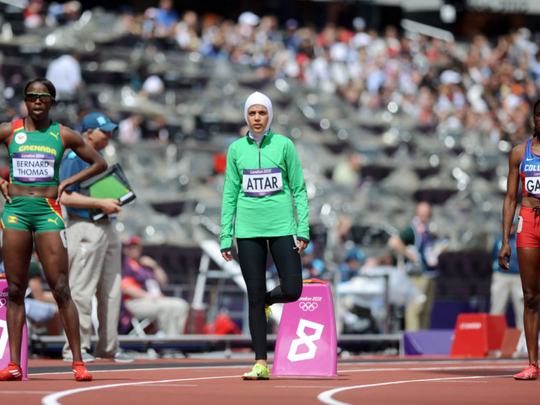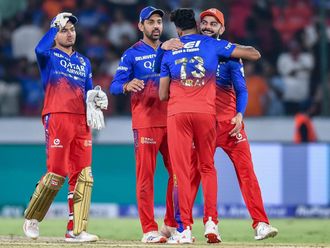
Dubai: Sarah Attar, one of the first female athletes to represent Saudi Arabia at the Olympic Games, has said her historic participation was not a “blip in the charts” and that it was “not an option” for the Kingdom to stop its women competing at the 2016 Olympics in Rio de Janeiro.
Attar, now 21 years old, got a standing ovation at the London 2012 Olympics despite finishing last in the 800-metre heats with a time of 2min 44.95sec, more than half a minute slower than her nearest competitor.
Attar and judoka Wojdan Shaherkani were the two Saudi female athletes awarded last-minute wildcards by the International Olympic Committee ahead of London 2012. And, despite their failure to advance in their respective competitions, Attar says they made a historic stand for equal rights.
Following the death of King Abdullah last month, his successor and half brother King Salman will continue his advocacy of women’s rights, and Attar is hopeful women’s sport will continue to grow in the conservative state.
“It’s not just a blip in the charts by any means,” Attar told Gulf News. “I don’t know the details leading up to the 2016 Olympics, in my opinion though it almost doesn’t seem like an option not to send any females to participate.
“There is definitely interest from women to continue the movement so it’s important to focus on that progress. The most powerful thing I have observed about our participation is that there is now a generation of girls growing up with the possibility of women competing at the Olympics. They see sport and athletic competition as something they can strive towards.
Inspiring
“I spoke at my cousin’s school in Jeddah to an auditorium of about 700 girls recently and was so inspired to see how the girls looked up to me. I asked them who would like to compete in the Olympics some day, and all of their hands shot up and the room filled with shouts of excitement. That type of excitement doesn’t fade.”
Attar, who was born in Escondido, California, to an American mother and Saudi father, said she was always aware of why she was running.
“The race was a whirlwind, but extremely powerful,” she said. “The roar of 80,000 people cheering for you is unlike any experience. It was the crowd that pulled me around the track, just knowing that an Olympic stadium full of people were cheering me on and supporting what I was doing was incredibly moving.
“I was definitely aware of the cause from the beginning — it was the main motivator from the start. I knew that I wouldn’t be Olympic qualified at the time of competition, but my participation was what was important.”
Of the reaction to her participation, Attar added: “Though I couldn’t have fully known beforehand the extent of the reactions, I knew that it was going to be controversial on some level. Whenever anything new emerges, there are going to be mixed views.
“Though many people were initially against it, after it happened many of these same people were OK with it. I also had a lot of positivity and support from family and friends in Saudi Arabia.
“Initially it was difficult seeing the negative views that my participation received. I knew that my participation was a positive though. Some people are always going to speak out negatively about things, and at the same time there are people who speak positively. It’s crucial to focus on the positivity and the supporters.”
Attar is still running, albeit over longer distances, and hopes to participate at Rio 2016. But, even if she can’t compete, she hopes to be an advocate for women’s sport in Saudi Arabia and believes the country’s culture isn’t at threat from female participation.
Deep connection
“I will always have a deeper connection to the cause. I am not sure where that deeper connection will lead me, but I know my participation was a pivotal point in my life that opened up many possibilities. I am passionate about women’s involvement in sports and believe that, when there is passion, there is progress.
“Through that progression, women in sport will coexist with the Saudi culture. Aspects of the existing identity will adjust, but by no means is it something that will be lost.
“It is not the norm in Saudi Arabia for women just to go out for a run. But I think, as competition in sports becomes more desired, there will be an emergence of proper facilities that allow for proper training. I was in a unique position [living and training in the US] that allowed me to participate in the Olympics.
“I hope that there will be a surge in women’s sports. Based on the interest I have seen and experienced there, I believe this will happen. Sports has had such a positive impact on my life and I believe it teaches many important life lessons through participation.
“It makes you aware of your strength and that we are more capable than we imagine. It also teaches you determination and the impact that other aspects such as nutrition and training can have on your overall well-being.”












